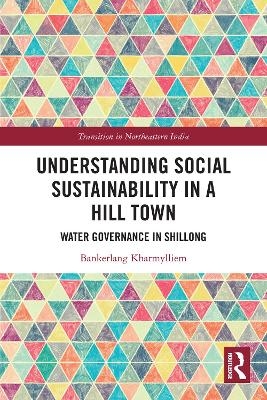
Understanding Social Sustainability in a Hill Town
Water Governance in Shillong
Seiten
2024
Routledge India (Verlag)
978-1-032-39692-7 (ISBN)
Routledge India (Verlag)
978-1-032-39692-7 (ISBN)
- Lieferbar (Termin unbekannt)
- Versandkostenfrei innerhalb Deutschlands
- Auch auf Rechnung
- Verfügbarkeit in der Filiale vor Ort prüfen
- Artikel merken
Nestled amidst rolling hills, Shillong, the Himalayan capital city of Meghalaya in India’s northeast, faces a growing challenge of water scarcity. This timely book examines the role of urban and traditional village councils in shaping equitable water distribution and management through the lens of social sustainability.
Nestled amidst rolling hills, Shillong, the Himalayan capital city of Meghalaya in India’s northeast, faces a growing challenge of water scarcity. This timely book examines the role of urban and traditional village councils (the Khasi dorbar shnong) in shaping equitable water distribution and management through the lens of social sustainability.
The book navigates through the complexities of water governance, shedding light on the challenges and opportunities and elucidating the interplay between tradition and modernity in urban governance. It also features narratives of success and struggle, and covers diverse themes, including social capital and gender. It initially foregrounds social sustainability setting the context for the study. It ventures into a detailed examination of the institutions of the village councils, with particular attention to water equity and water governance, including highlighting differences between municipal and non-municipal areas. The volume offers significant theoretical and empirical insights into Shillong's water challenges, filling a gap in the literature on northeast hill towns/cities.
Part of Transitions in Northeastern India series, this book will be valuable to a diverse audience including students, researchers, policy practitioners, community leaders, and general readers interested in urban studies, sociology, development studies, public administration, Asian studies, sustainability, and those concerned about our urban-water future.
Nestled amidst rolling hills, Shillong, the Himalayan capital city of Meghalaya in India’s northeast, faces a growing challenge of water scarcity. This timely book examines the role of urban and traditional village councils (the Khasi dorbar shnong) in shaping equitable water distribution and management through the lens of social sustainability.
The book navigates through the complexities of water governance, shedding light on the challenges and opportunities and elucidating the interplay between tradition and modernity in urban governance. It also features narratives of success and struggle, and covers diverse themes, including social capital and gender. It initially foregrounds social sustainability setting the context for the study. It ventures into a detailed examination of the institutions of the village councils, with particular attention to water equity and water governance, including highlighting differences between municipal and non-municipal areas. The volume offers significant theoretical and empirical insights into Shillong's water challenges, filling a gap in the literature on northeast hill towns/cities.
Part of Transitions in Northeastern India series, this book will be valuable to a diverse audience including students, researchers, policy practitioners, community leaders, and general readers interested in urban studies, sociology, development studies, public administration, Asian studies, sustainability, and those concerned about our urban-water future.
Bankerlang Kharmylliem is an assistant professor of sociology at Shillong Commerce College in Meghalaya, India. He earned his master's degree in development studies and completed his Ph.D., both at the Indian Institute of Technology (IIT) Guwahati, India. His range of interests spans urban studies, water governance, among others. He is particularly interested in exploring the interrelations between urbanism and lived experiences.
List of Tables. Preface. Acknowledgements. List of Abbreviations. Introduction. 1. Water, Cities, and Social Sustainability: An Introduction 2. Navigating the Setting 3. The Village Councils in the City 4. Water (In)equity 5. Urban-Local Water Governance 6. Towards a Desired Water Future. References.
| Erscheinungsdatum | 05.09.2024 |
|---|---|
| Reihe/Serie | Transition in Northeastern India |
| Zusatzinfo | 29 Tables, black and white; 4 Halftones, black and white; 4 Illustrations, black and white |
| Verlagsort | London |
| Sprache | englisch |
| Maße | 156 x 234 mm |
| Gewicht | 535 g |
| Themenwelt | Naturwissenschaften ► Biologie ► Ökologie / Naturschutz |
| Naturwissenschaften ► Geowissenschaften ► Geografie / Kartografie | |
| Sozialwissenschaften ► Soziologie ► Spezielle Soziologien | |
| Technik ► Architektur | |
| Technik ► Umwelttechnik / Biotechnologie | |
| ISBN-10 | 1-032-39692-X / 103239692X |
| ISBN-13 | 978-1-032-39692-7 / 9781032396927 |
| Zustand | Neuware |
| Informationen gemäß Produktsicherheitsverordnung (GPSR) | |
| Haben Sie eine Frage zum Produkt? |
Mehr entdecken
aus dem Bereich
aus dem Bereich
Planung · Recht · Verfahren
Buch | Hardcover (2024)
Springer Vieweg (Verlag)
64,99 €


